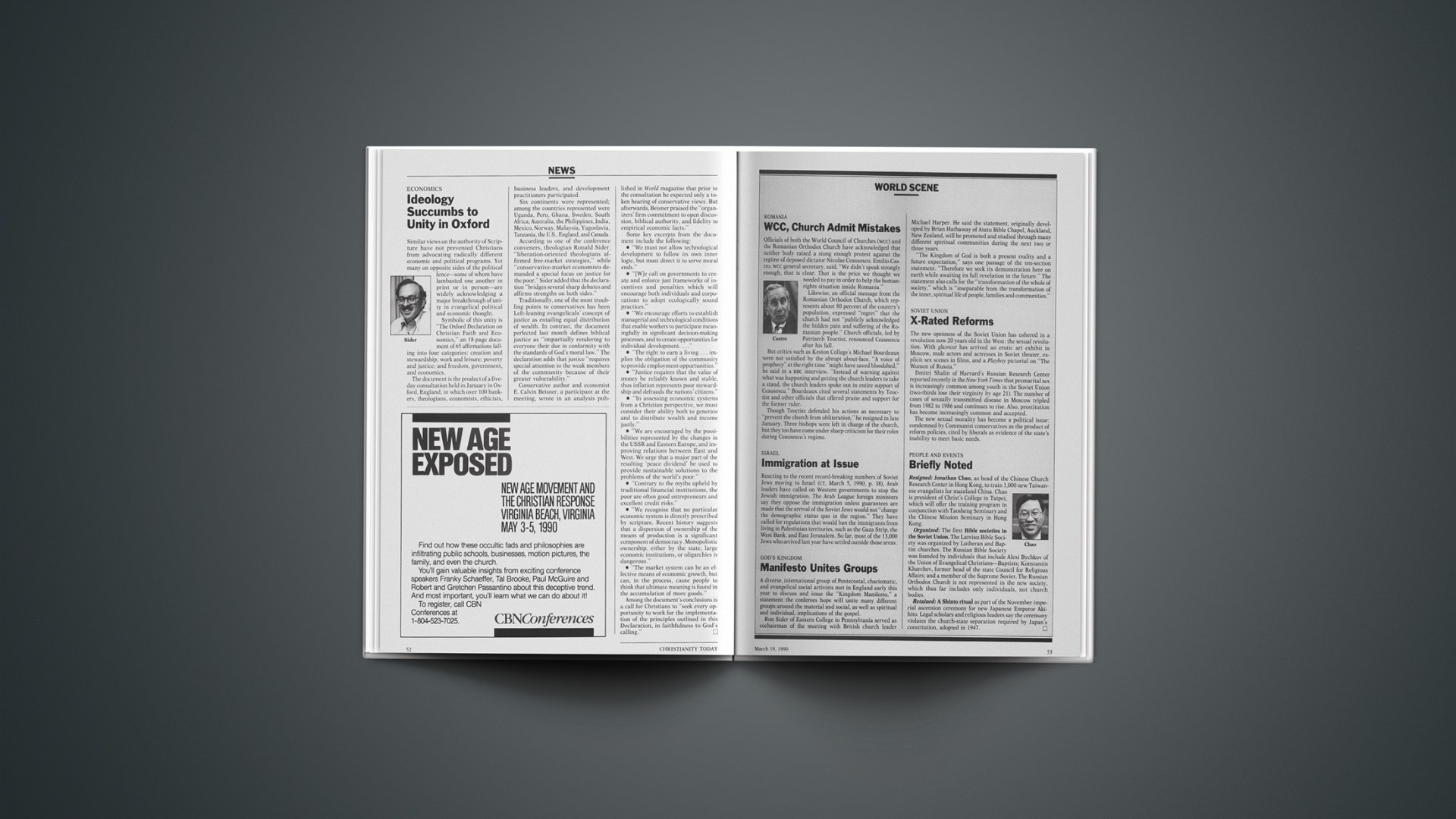Similar views on the authority of Scripture have not prevented Christians from advocating radically different economic and political programs. Yet many on opposite sides of the political fence—some of whom have lambasted one another in print or in person—are widely acknowledging a major breakthrough of unity in evangelical political and economic thought.
Symbolic of this unity is “The Oxford Declaration on Christian Faith and Economics,” an 18-page document of 65 affirmations falling into four categories: creation and stewardship; work and leisure; poverty and justice; and freedom, government, and economics.
The document is the product of a five-day consultation held in January in Oxford, England, in which over 100 bankers, theologians, economists, ethicists, business leaders, and development practitioners participated.
Six continents were represented; among the countries represented were Uganda, Peru, Ghana, Sweden, South Africa, Australia, the Philippines, India, Mexico, Norway, Malaysia, Yugoslavia, Tanzania, the U.S., England, and Canada.
According to one of the conference conveners, theologian Ronald Sider, “liberation-oriented theologians affirmed free-market strategies,” while “conservative-market economists demanded a special focus on justice for the poor.” Sider added that the declaration “bridges several sharp debates and affirms strengths on both sides.”
Traditionally, one of the most troubling points to conservatives has been Left-leaning evangelicals’ concept of justice as entailing equal distribution of wealth. In contrast, the document perfected last month defines biblical justice as “impartially rendering to everyone their due in conformity with the standards of God’s moral law.” The declaration adds that justice “requires special attention to the weak members of the community because of their greater vulnerability.”
Conservative author and economist E. Calvin Beisner, a participant at the meeting, wrote in an analysis published in World magazine that prior to the consultation he expected only a token hearing of conservative views. But afterwards, Beisner praised the “organizers’ firm commitment to open discussion, biblical authority, and fidelity to empirical economic facts.”
Some key excerpts from the document include the following:
• “We must not allow technological development to follow its own inner logic, but must direct it to serve moral ends.”
• “[W]e call on governments to create and enforce just frameworks of incentives and penalties which will encourage both individuals and corporations to adopt ecologically sound practices.”
• “We encourage efforts to establish managerial and technological conditions that enable workers to participate meaningfully in significant decision-making processes, and to create opportunities for individual development.…”
• “The right to earn a living … implies the obligation of the community to provide employment opportunities.”
• “Justice requires that the value of money be reliably known and stable, thus inflation represents poor stewardship and defrauds the nations’ citizens.”
• “In assessing economic systems from a Christian perspective, we must consider their ability both to generate and to distribute wealth and income justly.”
• “We are encouraged by the possibilities represented by the changes in the USSR and Eastern Europe, and improving relations between East and West. We urge that a major part of the resulting ‘peace dividend’ be used to provide sustainable solutions to the problems of the world’s poor.”
• “Contrary to the myths upheld by traditional financial institutions, the poor are often good entrepreneurs and excellent credit risks.”
• “We recognise that no particular economic system is directly prescribed by scripture. Recent history suggests that a dispersion of ownership of the means of production is a significant component of democracy. Monopolistic ownership, either by the state, large economic institutions, or oligarchies is dangerous.”
• “The market system can be an effective means of economic growth, but can, in the process, cause people to think that ultimate meaning is found in the accumulation of more goods.”
Among the document’s conclusions is a call for Christians to “seek every opportunity to work for the implementation of the principles outlined in this Declaration, in faithfulness to God’s calling.”










